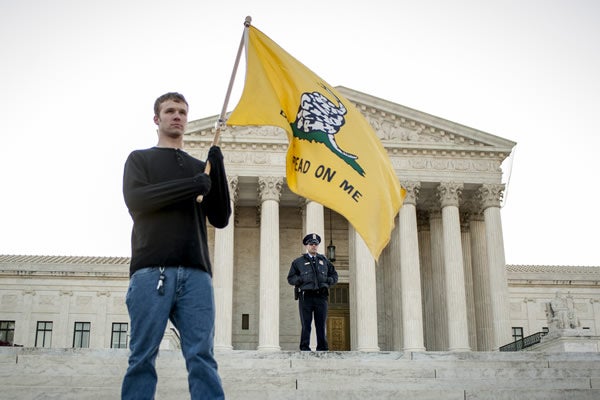Prosecution for exercising one’s free speech rights is becoming a trend in the current Administration and the Department of Justice (DOJ).
In April, the Legal Center highlighted the DOJ’s outrageous prosecution of Mary Susan Pine, a pro-life advocate. Thankfully, when the rubber hit the road, the DOJ lawyers had nowhere to go, and the suit was dropped. Pine is able to continue her ministry of standing near an abortion clinic to talk to women about abortion.
Julian P. Heicklen, an 80-year-old retired chemistry professor and advocate of jury nullification, found himself in a similar situation. Heicklen, as part of his activism, would stand in front of courthouses with a “Jury Info” sign, handing out pamphlets and explaining jury nullification to anyone who would approach him.
Advocates of jury nullification believe that jurors can use their de facto power to effectively change the law by refusing to convict a defendant under a law that the juror disagrees with. Heicklen specifically advocated against the enforcement of federal drug laws.
So what was the charge? Heicklen was accused of jury tampering, a federal criminal misdemeanor, punishable by up to six months imprisonment (which, ironically, means that the defendant is not entitled to a jury trial). The law, 18 U.S.C. 1504, prescribes the conviction of anyone who “attempts to influence the action or decision of any grand or petit juror of any court of the United States upon any issue or matter pending before such juror, or before the jury of which he is a member, or pertaining to his duties, by writing or sending to him any written communication, in relation to such issue or matter.” An FBI agent posing as a juror approached Heicklen, received a pamphlet, and asked Heicklen to explain what jury nullification was all about. Heicklen was indicted based on a recording of that conversation.
The case, United States v. Heicklen, resulted in a dismissal of the indictment. In a 27-page opinion, Judge Kimba Wood of the Southern District of New York dissected the construction of the law and also considered Heicklen’s constitutional claims. Wood determined that the language of the statute requires that the jury tampering be done with a specific case in mind. Although Heicklen, through his activism, wanted to influence the “duties” of a juror, he did not also intend to affect an “issue or matter” that came before the jurors.
The DOJ, on the other hand, encouraged the court to accept a broader definition of “issue or matter” that included speech to a juror on any subject that he might be considering. Judge Wood stated that such an expansive interpretation “would arguably chill protected speech” and “would at most render [the law] facially ambiguous.”
Clearly, Heicklen’s opinion on jury nullification is a viewpoint that the DOJ and other law enforcement officials do not want to be widely publicized. Even a man filming Heicklen, photographer Antonio Musumeci, was arrested for doing so. (Charges against Musumeci were dismissed, and his subsequent lawsuit against Homeland Security was also successful.) But as Professor Paul Butler notes, he and many others have been advocating for jury nullification and have been published extensively, so that any potential citizen/juror could have heard and been influenced by him. If Heicklen was found guilty of jury tampering, could the same be done to Musumeci and Butler for further publicizing Heicklen’s message?
No matter what your stance may be on the issues of drug decriminalization or jury nullification, the right to peaceably and reasonably discuss either matter in public should be allowed without question. To arrest someone for discussing a matter of public concern peaceably in a public place—that’s a crime against free speech.































